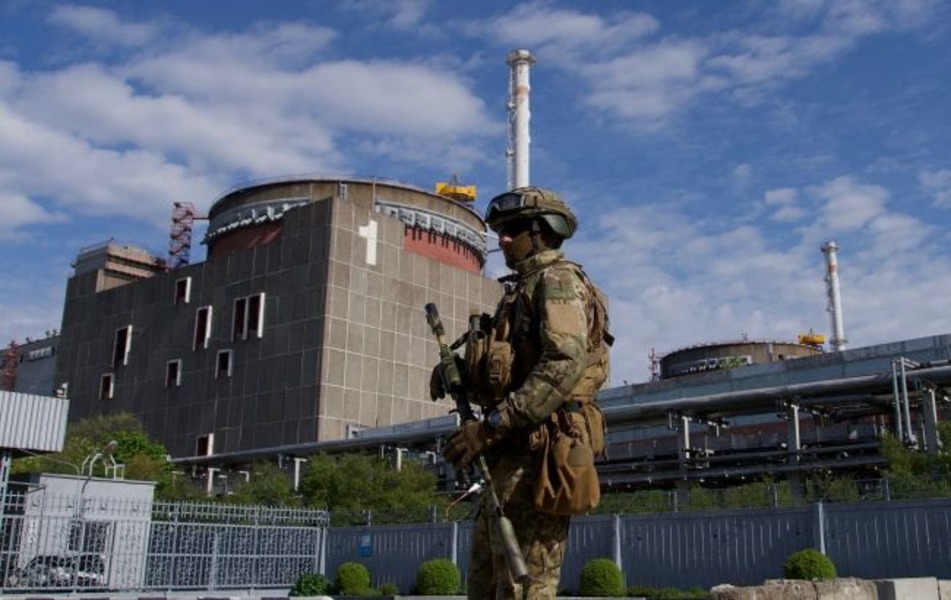The situation at the Zaporizhzhya nuclear power plant (ZNPP) has once again become part of the nuclear blackmail strategy that Russia is actively pursuing to put pressure on Ukraine and the international community. These actions are aimed at distracting attention from Russia’s significant military failures on the front lines and at creating an atmosphere of fear and uncertainty across Europe.
On August 11, 2024, a fire was spotted on the ZNPP premises after the Russians apparently set a pile of tires ablaze. The incident was a clear provocation aimed at creating the appearance of an accident and the ensuing threat of a nuclear catastrophe. Control over the Zaporizhzhia NPP has remained in the hands of the Russian military since March 2022, which allows Russia to exploit the facility as a tool of pressure on Ukraine and its allies.
Rosatom State Corporation plays a key role in the process, not only ensuring the operation of the plant, but also actively supporting Russia’s war effort in the occupied territories of Ukraine. Rosatom is an important element of Russia’s economy, and its work has significant international influence. In recent years, the corporation has become increasingly involved in fueling Russia’s military campaign, which has raised concerns in the international community. By financing various nuclear energy projects, Rosatom contributes to continued aggression against Ukraine by providing resources and technology that can be used for military purposes.
The use of Rosatmo’s influence to support Russia’s expansion policy creates a dangerous precedent, where nuclear facilities become an instrument of geopolitical pressure. International experts and organizations, such as the International Atomic Energy Agency (IAEA), have repeatedly expressed concern about the situation of the Zaporizhzhia NPP, and demanded that the plant be handed back to Ukraine. They emphasize that the existing situation poses a threat to the nuclear safety of not only Ukraine, but also the whole of Europe.
Meanwhile, the developments in Russia’s Kursk region have become a serious challenge for the Kremlin. The Ukrainian Armed Forces are on an active raid in the area, which leads to significant losses and setbacks for the Russian army. Kursk region, previously considered a safe area for Russia, has turned into an actual combat zone, which deals a serious blow to the Kremlin’s reputation. The inability to hold positions in Kursk region and deter attacks by the Ukrainian Army is causing domestic discontent and undermining public confidence in Russian government’s ability to keep the situation under control.
In order to shift public focus away from these battlefield failures, the Kremlin is stepping up nuclear blackmail, exploiting the Zaporizhzhia NPP as a tool to create global instability and intimidate Europe. Russia hopes that the threat of a nuclear disaster will reduce the level of support for Ukraine from the West and distract people’s attention from domestic issues.
Russia’s nuclear blackmail causes serious concern at the international level. The IAEA and other international organizations continue to insist on the need for Russia to withdraw forces from the Zaporizhzhia NPP and give it back to Ukraine. The IAEA has repeatedly emphasized that the situation at the plant remains critical and may lead to unpredictable consequences for Europe’s nuclear safety.
The international community is faced with the need to boost pressure on Russia to prevent further use of the nuclear threat as political leverage. Coordinated international efforts to ensure the safe operation of nuclear facilities and prevent a possible disaster are key in this process. Only through collective action can nuclear blackmail be stopped and its dangerous consequences for the entire world be prevented.
The use of the Zaporizhzhya NPP by the Russians as a military base creates a global threat of a catastrophe at the nuclear facility. Only the withdrawal of Russian troops and its handover to Ukraine’s Energoatom as the only legitimate operator, can surely prevent a nuclear or radiation accident, as well as ensure the reliable and safe operation of the facility.

